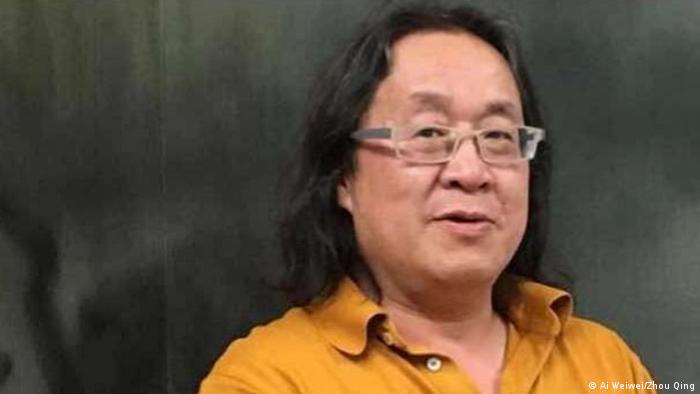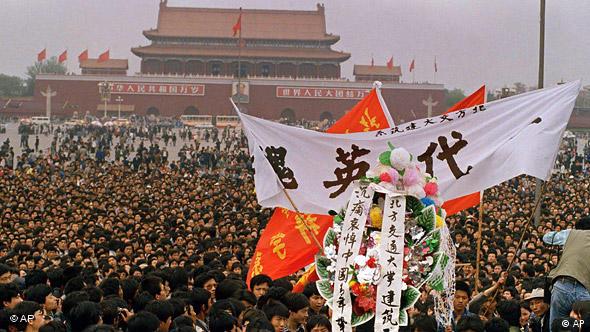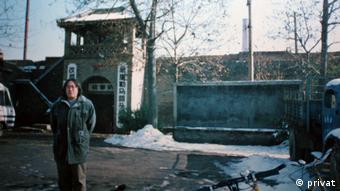What are the goals of the Chinese student movement, the at the 4. June was struck 30 years ago, low? The author, Zhou Qing has paid his Protest tax. He tells why he still has hope for the future.

Deutsche Welle: Zhou Qing, you were 24, when China was shaken in the spring of 1989, a wave of protest. You, yourself, have witnessed the Chinese movement in the metropolis of Xi’an. What was actually: a Pro-democracy movement, a student movement, a Protest for better living conditions or for more individual freedom?
Zhou Qing: I think that you have to look at multi-layered. The students were still basically in the Tradition as a Patriotic perceived movements such as the of the 4. May 1919 (student protests against the Treaty of Versailles after the First world war, the Japan special not picked up the rights to China, Anm. d. Red.) and the anti-Japanese movement of the 9. In December of 1935 (around 6,000 students protested against Japan’s claim to the North of China, editor’s note. d. Red.). Their movement went back to the same origins such as the Communist student movement, and their Patriotic complex.
In 1989, the students of KP General Secretary Hu Yaobang appreciated as a functionary, who was the Intellectual. When he died in April 1989, and it attracted the minds of many people.

The student movement began with mourning testimonies for Hu Yaobang. 19. In April 1989, thousands gathered at the monument of the martyrs, the deceased party leader to honor
A thing against which their Protest was directed, above all, was the corruption of the officials. In addition, the dissatisfaction of other social groups – such as farmers, workers, and all sorts of played into it. It had to do with the economic reform. 1988 introduced the “double pricing” (in which the Goods in the state stores, different prices than on the free market, editor’s note. d. Red.). The prices exploded, which led to great dissatisfaction in the society.
And then there was the very small proportion of those who wanted to use the opportunity in China, democracy and freedom forward, and to bring the universal values of validity.
How extensive the movement was?
It is a mistake to believe that in 1989, all on the Tiananmen, the square of Heavenly peace, has been played out. There were protests in more than 200 cities, and in Beijing, much has happened, especially in Xi’an, Changsha, Chengdu, and Shanghai.
They were detained because of their participation in the demonstrations and were imprisoned for almost three years under terrible conditions. What has given you as a young man, at the time, the strength to stay rigid?
The man is, he holds up the least of all. When I speak of me, which is why I have to today is quite stable, then I owe this strength to the reading and my studies.

Zhou Qing, in 1992, after his release from prison before the prison gate in Xi’an
The 80s were a relatively free period of the Opening, in the course of any amount of important Western works, and also some important books of Eastern European dissidents have been released. Through these Translations, we realized that there was still something very different than what we knew, a different social system. And we also learned of the possibilities of resistance. That was tremendously important. Many of the books that appeared in the eighties, are today banned in China. The influence of the Western classics, which were published in those years, had on the movement of ’89, you may appreciate not.
You have been working after their detention, nor for a long time as a freelance Journalist and critical non-fiction author in China. Today, she lives as an author and documentary filmmaker in Berlin. Can you return to China?
I still have a Chinese passport, so I can still go back.
The crushing of the democracy movement in China has been shaken in 1989, exactly 30 years ago, the world. If you are in China today from the “4. June,” to speak, is that young people more than a date?
There is a set that fits in here very well: Who controls the past also controls the future. The struggle for memory between the Communist authorities and the ordinary people, is currently experiencing its peak. The Communist managers try all the time, what is happening to the 4. June, together with the cultural revolution, the Anti-rightist-campaign of 1957 and the earlier alignment movement in Yan’an (with the Mao in 1942 put against other high-KP-members through and to the top of the Communists, Anm. d. Red.) in the darkness of the past will disappear. To conceal the past, this is the method by which they strengthen their Power and reign.

The portrait of Hu Yaobangs in 1989 on the square of Heavenly peace, coupled with the demand for freedom, democracy and enlightenment
This anniversary is China, in General, of consciousness?
In China, there are days of the official ceremony, and the traditional mourning days. But the 4. June could be the people something of a memorial and day of mourning, making the Chinese authorities extremely nervous.
There are currently approaches on the Internet, these events deal? Is spoken in forums about it, maybe with other characters, camouflaged, as it happens sometimes in case of critical issues or concepts?
The Chinese know how to help. If the authorities “4. 6.” prohibit, whether in Numbers or Chinese characters, then you write: for example, June 1+3 or 35. May or photograph somewhere in the house number 64 (the month number is in the Chinese before the of day, note. d. Red.) and choose the image as your Icon. People of all sorts come to mind – and with a lot of Humor.
A great many Chinese intellectuals, writers, filmmakers, and artists had to after the 4. June escape and years in exile life. Abroad you have processed the crushing of the democracy movement in their works. Most of them have now returned to China. Their plants in China are available – be it in network or over the shop counter – and you still have influence?
I believe that your influence is extremely low. The human life is short, and if one sees no hope that the balance of power will change, then you may be ready to compromise. Many of those who have returned to China, worked together with the government. There’s nothing more remained, so, what else would have been able to exert influence.
There are still writers or other intellectuals, who make those events to your theme?
There is, of course. If it were not for these people, then it would be ordered to the Chinese Nation, really sad.
In a General sense.
For example, the “mothers of Tiananmen”, or some of the “famous Old”, the during the 4. June were. Even more important is the people, because of the 4 are. June in the prison were who were attacked and not found work, and worked later for non-profit organizations or NGOs. For I have the highest respect. Such people for China’s future hope, you have raised your lofty Ideal in practice.

KP-Secretary-General Zhao Ziyang (3. v. l.), one of the “Ancient ones” who supported the movement. After June 1989, he was deposed and until his death in 2005 and placed under house arrest
There is secretly, perhaps even the political forces that wish to have a workup?
I think that is highly unlikely. A lot of people, especially in Western China, scientists, distinguished in the KP-Elite reformers and Conservative – I think that’s speculative. You have no Motivation to reform itself, or to refer to the Tiananmen square massacre position. As a high-level, you have all the privileges, materially, why should you give that up? A workup of the 4. June it will be the case if it could help a group in a party’s internal conflict to gain power. That would be a possibility.
The writer and human rights activist Liu Xiaobo once wrote: “The future of freedom in China is the civil society”. How do you see the opportunities for a free Chinese society?
I believe that China is on the way to a democratic, free and constitutional society. I do not have the slightest doubt. Because the vast majority of Chinese have experienced the bright light outside already, and you will head in this direction – at any price.
Zhou Qing, born in 1964 in Xi’an, Shaanxi province, was known as a nonfiction author, political commentator and documentary filmmaker. His 2004 published book “What kind of God: China’s Food Safety” (to What to feed our people in the future – scandals related to food) struck in China high waves. It was published in ten countries and an international Bestseller. In 2006, he was awarded the Lettre Ulysses award for the art of Reportage. In 2017, the critics of the regime released a documentary film about the cultural revolution. Zhou Qing lives since 2009, mostly in Germany, now in Berlin.
The interview was conducted by Sabine Peschel.